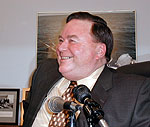Johnson retirement may signal declining political power for rural Minnesota
By Michael Khoo
Minnesota Public Radio
March 18, 2002
State Sen. Doug Johnson, DFL-Tower, has announced that he's stepping down after more than 30 years at the Legislature. Johnson currently chairs the Senate Finance Committee, but made his biggest mark during more than two decades as the Taxes Committee chair. Lawmakers from both bodies and both sides of the aisle praised Johnson's sense of fairness and his dedication to his northeastern constituents. But some worry his departure will weaken the clout of rural Minnesotans.
| |
|
|
|
||
Johnson entered political life at the ripe age of 23 when he ran for - and won - the race for mayor of Cook, Minnesota. He was elected to the House in 1970 and six years later, landed in the Senate. Now, approaching his 60th birthday, he says he's ready to let others carry on the work. He says he came to that decision while watching ducks land on from his lake home. Johnson says his most important accomplishments came as chair of the Taxes Committee.
"I think independent analysis will show that over that 20-year period that I was successful and fought for a fair tax system in the state - at times against considerable odds," he said.
Johnson stepped down from the Taxes Committee after the Senate adopted rules imposing term limits on committee chairs.
Johnson cites as his other successes his economic development efforts for northeastern Minnesota, including bringing Northwest Airline jobs to Duluth and Chisholm.
Fellow DFLer and Senate Majority Leader Roger Moe, who is also stepping down this year to run for governor, says Johnson's influence wasn't limited to the Iron Range.
"Doug was always able to find the balance. Because there's always competing interests in this process, but he - in a very diplomatic way - was able to kind of balance these competing interests and find a tax policy that was fair," Moe said.
Johnson authored every major Senate tax bill from 1981 to 2000 at a time when many Republicans say Minnesotans were paying far too much in taxes. But even his sometime adversaries give Johnson credit for being open and accessible to compromise.
House Taxes Committee Chair Ron Abrams worked with Johnson for 14 years. The Minnetonka Republican says taxes are used to raise revenue, and he and Johnson often disagreed about the appropriate level of taxation, but that tax policy can also be used to shape policy.
He says on that score, Johnson should be commended for his common sense approach. "Minnesota was cited continuously, at national meetings for bold and sensible responses to a number of public policy problems," Abrams said.
Johnson's departure comes at a sensitive time for rural Minnesota. In addition to Moe, DFLer Becky Lourey of Kerrick is running for governor. And DFLer Sam Solon of Duluth passed away earlier this year.
Redistricting plans are also likely to shift legislative power to the metropolitan suburbs.
Political scientist Craig Grau of the University of Minnesota-Duluth says Johnson's will be a significant blow to northern interests. "He had committee positions that - like the tax committee, finance committee - where he could do a lot. But he also knew a lot. He knew a lot about those subjects. And so, I think, people deferred to him," he said.
But Grau says it's unlikely Johnson will simply fade into the background. And Johnson himself says he'd like to continue some part of his work.
"I'm expecting that there may be some unknown role right now in the public and private sector to still work on economic development for greater Minnesota and particularly the northeast," Johnson said.
But he says he's not interested in returning to state government, even if a DFLer were to capture the governor's office and offer him a state agency to manage. He says he prefers the views on Lake Vermilion to the concrete parking lots he sees from his Twin Cities apartment.

